
18 minute read
Programs scale back or go virtual
Organizers find ways to continue programs by scaling back or going virtual
Photo courtesy of Tree Trekkers
Advertisement
Written by MEG H. PARTINGTON
COVID-19 put a damper on camps in 2020, but the spirit of exploration was not doused. In the Tri-State area, many organizers found ways to continue their summer programs by either scaling back or moving them to the virtual world.
With vaccines available now and the spread of the coronavirus seeming to slow, camp staffers across the Tri-State are optimistically planning fun, enriching activities so youths can recapture the magic of summer.
Here’s a sample of the possibilities that await.
No stopping the show
Creative thinking and the ability to quickly adjust to curveballs allowed
Authentic Community Theatre Inc.
to hold its summer camps in 2020.
“It was a little bit difficult and a little bit different than we’re used to,” said Britney Soto, office administrator and treasurer of ACT’s board of directors.
While Maryland’s COVID-safety requirements did not require face masks at the time, they were used during rehearsals, but not performances. The performances that capped the end of the camps were not in front of live audiences, but streamed live on social media.
Soto is hoping that this summer, the young actors and actresses who take part in ACT camps can share their culminating shows with people sitting in front of them in the same room.
The art camp that is typically held at Doub’s Woods Park in partnership with Washington County Parks & Recreation will take place indoors and outdoors at the ACT site on Florida Avenue in Hagerstown for those in grades one to eight.
A performing-arts camp for grades one to 12 will be at the ACT facility and will conclude with a variety show, Soto said.
SUMMER CAMPS

72
A two-week camp held in partnership with The Maryland Theatre for grades one to 12 will be divided between ACT and the theater. The finale will be a full production of “Frozen Jr.”
Children will be kept in small groups during the camps, and safety protocols that have allowed ACT to offer three semesters of classes and put on three productions during the pandemic will continue, Soto said. The organization had no outbreaks of COVID-19, she said, and used livestreaming when necessary so audiences could still see the fruits of the organization’s theatrical labor.
Plastic masks that allow actors’ mouths to be seen will be used if face coverings are required by the state. Soto said they are contoured to actors’ faces and look more like goggles than masks. Supports that keep the devices slightly away from the mouth for better projection might also be utilized.
“We’re super confident in our process and how we handle things,” Soto said. “We follow everything that the health department tells us” in terms of practices required to prevent the spread of the coronavirus.
Creative use of the great outdoors/indoors
With short notice that camps could be held in the Mountain State in 2020, the
Jefferson County (W.Va.) Parks & Rec-
reation Commission quickly finalized all of its plans so campers could put their bodies and imaginations in motion.
“We literally had a week and a half to get the ball rolling,” said David Kling, assistant director of the JCPRC.
The staff was ready with personal protective equipment, loads of hand sanitizer, and electrostatic sprayers to disinfect areas like bathrooms and playground equipment, sometimes multiple times a day, said Heather Burgos, recreation coordinator for the JCPRC. They created individual packs of arts and crafts supplies for campers to limit the sharing of germs and prevent counselors from having to disinfect such small items throughout the day. Tents were set up outside, where children’s temperatures were taken daily upon arrival.
Last summer, state and local COVID-prevention guidelines meant none of the camps could be held on school properties like they had been in the past, so indoor space for activities was greatly reduced, Burgos said. But ongoing partnerships with River Riders in Harpers Ferry, W.Va., and The New Hopewell Center for the Arts in Kearneysville, W.Va., provided off-site options.
“That actually helped a lot,” she said.
The Jefferson County Community Center in Sam Michaels Park was still available in Shenandoah Junction, W.Va., but it could only be used for a limited number of activities due to spacing requirements dictated by the coronavirus, Kling said. Sports camps in particular were greatly reduced.
“People were so unfamiliar with the mask thing,” Kling said, so many of the sports camps were canceled.
Burgos added that parks and recreation commission staffers were not sure if people would be willing to wear masks during exercise and they also wanted to maximize the space between campers.
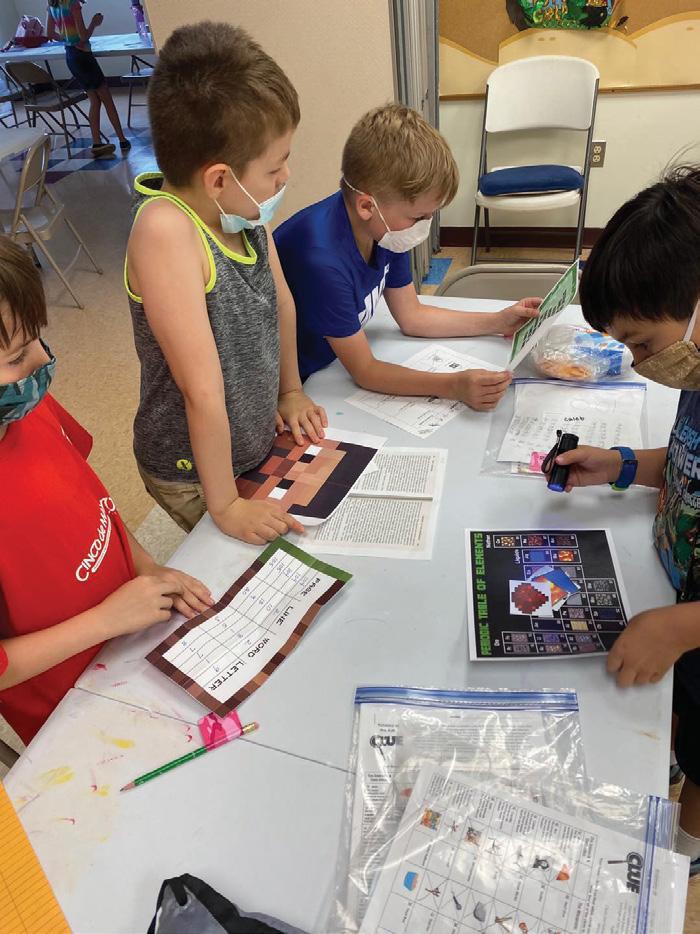
In Jefferson County (W.Va.) Parks & Recreation Commission's Escape This ... Camp, campers work on puzzles, which when correctly solved allow them to receive a key to unlock the next clue. Submitted photos


During Adventure Camp with Mr. Earl, Jefferson County (W.Va.) Parks & Recreation Commission campers took a field trip to James Hite Park in Kearneysville, W.Va., to fish and roast hot dogs. The most interesting “catch” of the day was this frog. Submitted photo
When more indoor programs were held in autumn, JCPRC staff noted that a lot of people wore masks by choice. As cases of the coronavirus began to rise in Jefferson County, those in the recreational programs who were 3 and older were required to wear them, Burgos said. Even the younger children handled that necessity well, which gave the staff a lot of confidence about how things will work this summer if similar mandates are in place, she added.
Day camps in 2020 included archery, gymnastics and adventure options, plus ones for those in early elementary school with themes such as “Frozen” and animals, Burgos said. Most of the art camps were virtual.
While camps for this summer were still in the planning stages in mid-January, Burgos said the hope was to bring back more preschool programs, the number of which were reduced last year in order to put safety first.
Kling said more activities will be held in the community center, especially sports camps, if state and county guidelines allow. About 90% of the activities were held outside last year out of necessity, he added.
“I think we’re pretty much expecting the same guidelines to be in place this year,” Burgos said, including mask wearing indoors, distancing, additional safety training for staff, and daily health screenings of campers and counselors.
The JCPRC is hoping to hold some camps the first week of June, right after schools close for summer break, then expand the number of offerings through early August, Burgos said.
New Hopewell Center for the Arts will be home to circus- and farmthemed camps, as well as a fantasy camp, where things like wizards and fairies will be explored, she said. It is anticipated that the Amp, a performance venue at Sam Michaels Park, can be used more this year, too.
“We strive to offer experiences for lots of different interests,” Burgos said. “It is really all about being creative with space on the administrative part, and creative with activities on the camp staff part. We have some fantastic camp staff.”
73
Worst- to best-case scenarios
Just as it plans multiple activities, Mercersburg (Pa.) Academy has several strategies in place for summer camps.
Peter Kallin, director of summer and external programs, said the academy has a four-tiered plan that outlines worstcase (no camps) to best-case (all camps held without restrictions) scenarios.
Optimistic that camps can be held in person, he said the academy will follow health and safety procedures used when boarding students returned in the fall of 2020, which will be modified to meet updated guidelines from the Centers for Disease Control and Prevention or state of Pennsylvania, if necessary.
“We’ll continue to have excessive sanitization practices,” said Kallin, who was hired by Mercersburg Academy in August 2020 and also serves as the head varsity boys soccer coach.
Participants will be asked to quarantine for seven to 10 days before they attend a camp and take a PCR (polymerase chain reaction) coronavirus test three to five days before arriving, Kallin said. There is talk of possibly testing campers for the virus the day they get on-site, he added, and students’ health will be monitored daily. Masks and hand sanitizer will be part of the welcome packet given to the boys and girls ages 8 to 17 who register to attend.
The goal is to “keep things safe and fun at the same time,” said Kallin, adding that camp staffers will wear masks if state mandates require them to do so.
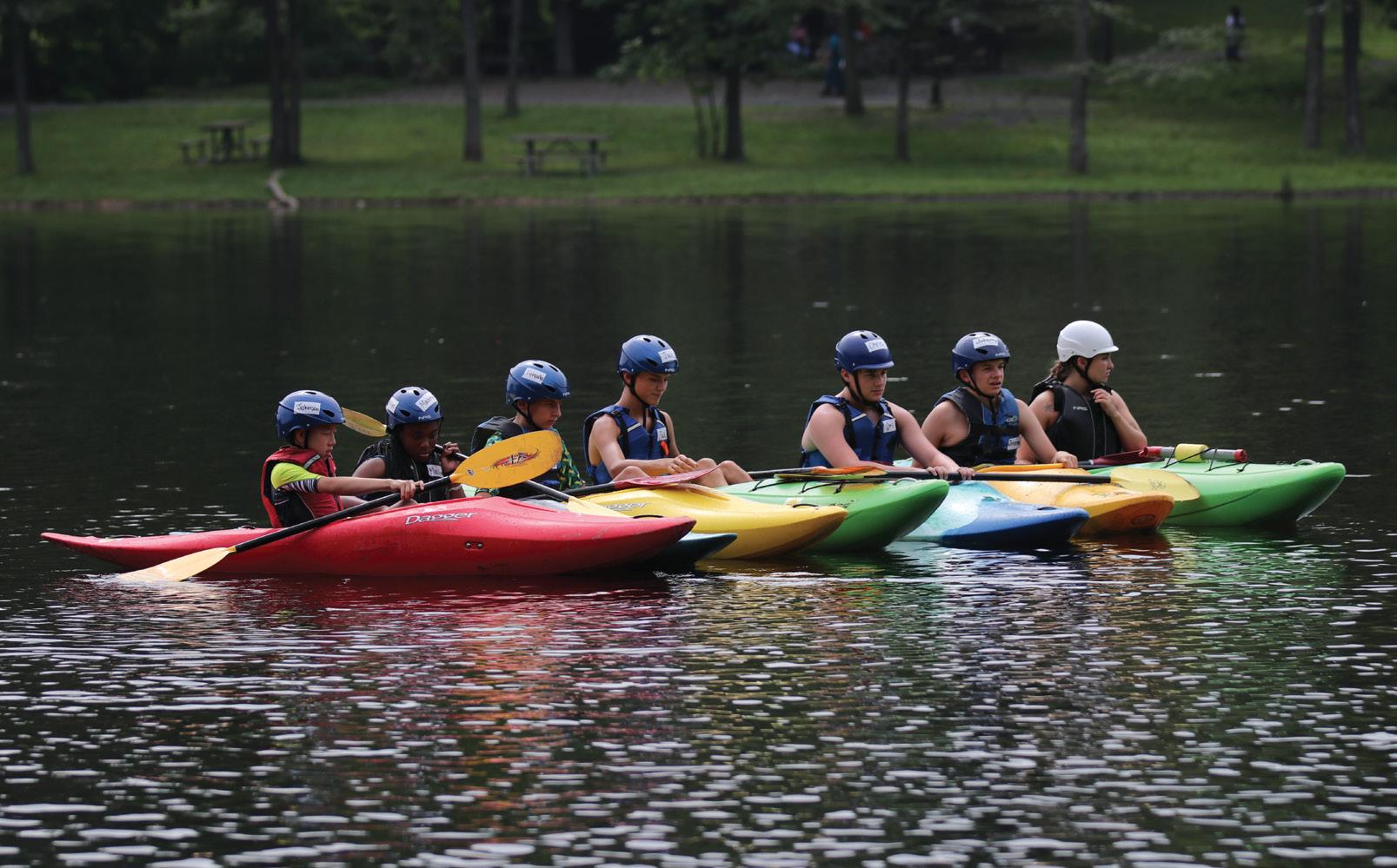
74

Mercersburg (Pa.) Academy STEAM Camp participants work on a project together. Submitted photo
The co-educational summer programs have day and overnight options for the young people who come from all over the globe to play basketball, soccer or lacrosse; dive into swim clinics or adventure camps; or explore STEAM (science, technology, engineering, art and math), writing or the performing arts.
Typically, more than 1,000 kids gather at the Cumberland Valley campus between June and August to enjoy programs that Kallin said feature traditional camp activities such as playing capture the flag and sitting around campfires. Myriad outdoor activities are scheduled, for which masks will not be required when safe distances can be maintained.
The children and teens will wear masks when inside, but hopefully will not be mandated by state and federal regulations to sport them outside, Kallin said. Tents and tables will be set up outside for grab-and-go lunches if they are not allowed to eat indoors.
Kallin said about three-quarters of the camps are residential, while the rest are day camps. Residential participants will be kept in cohorts of 20 to 30 based on their camp topic. They will wear masks while in the dorms, but won’t have to when they are in their two-person rooms. Kallin said 15-minute evening wash-up sessions will be done by room instead of in large groups.
Knowing the situation is fluid, the academy is going to be flexible in terms of refunds if camps are canceled due to COVID restrictions or if a family decides not to send a child at the last minute due to health concerns. Kallin said all COVID-19 guidelines are subject to change, based on CDC and state regulations at the time the camps start.
“We’ve tried to be very sensitive, knowing where the world is (right now),” Kallin said. “We’re trying to make it as flexible as possible. I don’t want people to have that worry in their mind” about not getting their money back. Lofty spaces
When you’re in the treetops, it’s easy to keep your distance from others.
Because only one camper uses one obstacle at a time, Tree Trekkers Frederick LLC was able to conduct summer programs in 2020 with 20 children per session over four sessions, said Ashley Schweinhart, site and marketing manager for the facility at 9560 Old National Pike in Frederick, Md.
Four, four-day camps are scheduled at the outdoor aerial challenge and zip line park from 10 a.m. to 3 p.m. between June 22 and Aug. 20. Participants will be grouped by age – 7 to 10 years old; 10 to 13; and 13 to 15. Themes such as adventure, nature and STEM (science, technology, engineering and math) will be reflected in the activities the children do when they are on land and high off the ground, Schweinhart said.
Measures taken last year to keep children and staff safe will continue, including having everyone wear masks; assigning every camper his/her own gloves for climbing; and using all-natural disinfectant and ultraviolet light on surfaces and equipment to kill germs, she said.
“We were trying to get creative” so the camps could be held last summer, Schweinhart said.
Social distancing was tricky last year during group activities because the children were so excited to be with their peers and often just wanted to play together.
“They’re starved for it,” she said.


A camper sails through the woods on a Tree Trekkers zipline. Submitted photo
This year, games will be more structured to allow that vital interaction while ensuring at least 6 feet are kept between the campers, she said.
Participants will start with a group exercise, then be taught how to properly use and care for their harnesses and other equipment, Schweinhart said. They will practice what they have learned until they are ready to climb. Like last year, children can have food or drink at any time they need it in the picnic area, where a “den mother” will have activities prepared for them. Among the pursuits being considered are identifying leaves; making bird feeders; concocting homemade ice cream; parachuting activities; and doing scavenger hunts on the obstacle courses.
The fun and adrenaline-pumping options are not limited to summertime on the seven-acre portion of the 30-acre expanse that Tree Trekkers occupies. Schweinhart said after-school climbing clubs and field trips are available during the school year.
75
Engaging the mind and body
After a school year dominated by virtual learning, Penn State Mont Alto is striving to offer in-person enriching activities for youths, but only if it’s wise to do so.
“Safety is absolutely, unequivocally No. 1,” said Helen McGarry, director of continuing education at PSMA.
The pandemic led to the cancellation of summer camps at the local campus in 2020, which makes it more vital that they be offered this year, either in person, virtually or a mix of both, she said.
McGarry said PSMA is motivated to offer something educational, engaging and valuable to prevent the learning loss that can easily happen when school is not in session and to provide fun activities that are crucial to kids’ well-being.
In June and July, PSMA typically offers academically oriented camps catered to those entering their freshman year of high school through rising juniors in high school.
For those wanting to explore careers in science and health care, MedCamp is expected to be a combination of its typical hands-on format and virtual.
“We are planning to move forward with some kind of modified MedCamp,” McGarry said.
Consideration is being given to holding it for fewer than the usual five days and making the camp hours shorter, while also lowering the number of participants per group on campus. Gone will be the traditional field trips to places like Chambersburg (Pa.) Hospital, Shenandoah University in Winchester, Va., and Penn State Health Milton S. Hershey Medical Center, McGarry said.
“If it’s not absolutely necessary, we won’t do it,” she said.
Instead, it is hoped that Zoom presentations will be provided by representatives from the places the students would have visited, followed by debriefing sessions with PSMA staff and small breakout groups, McGarry said.
“It’s a homegrown program that you can’t get prepackaged,” so MedCamp is difficult to re-create completely virtually, she said.
For the portions that will not be online, 6-foot distances will be maintained between people, masks will be worn and the use of hand sanitizer will be a constant, she noted.
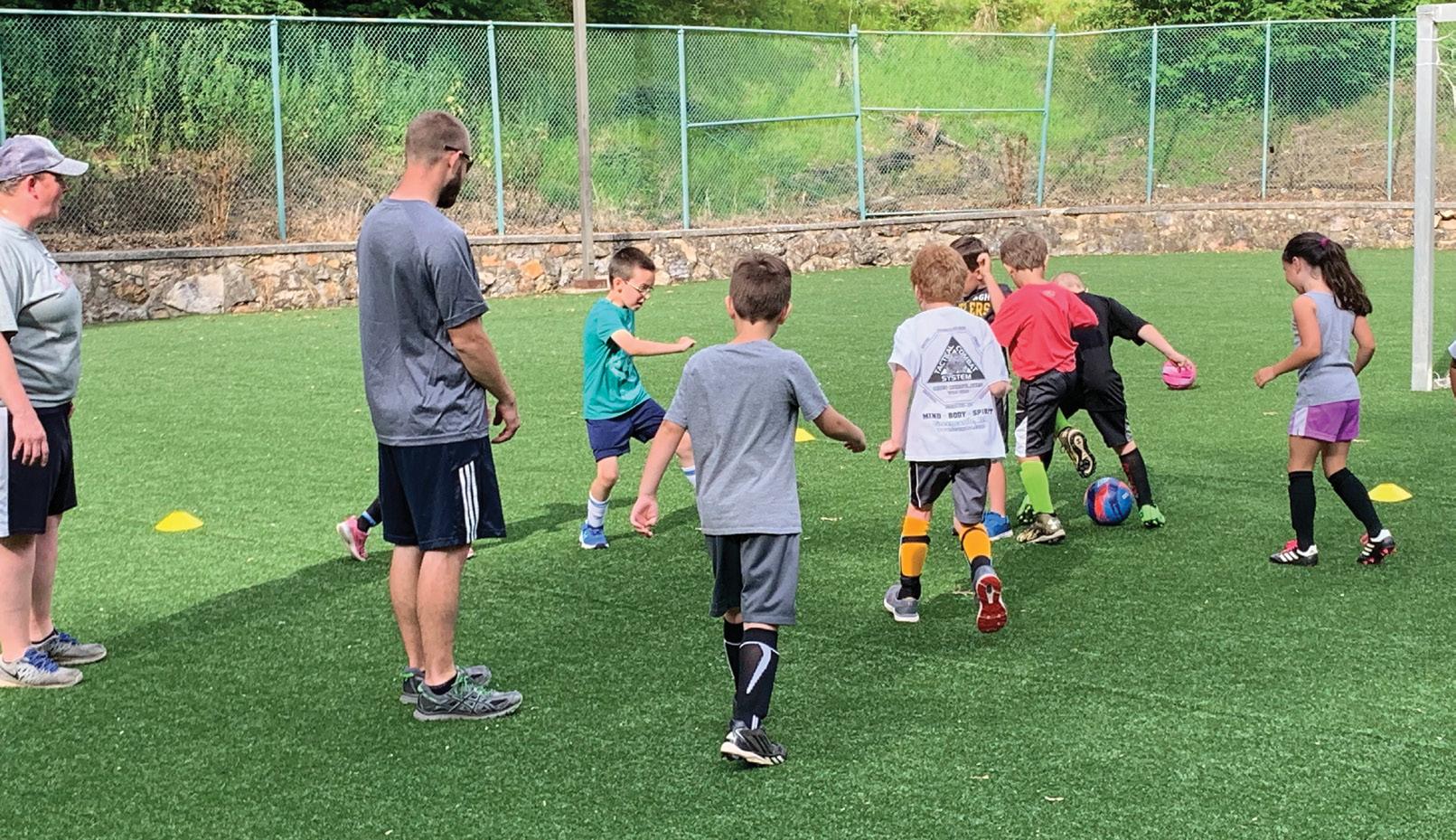
76
In contrast, STEM and Teen Entrepreneur camps will be completely virtual, and organizers are working diligently to make them engaging and entertaining. There is talk of having online breakout groups so campers can work on projects together, while incorporating plenty of respite from computer screens.
“The golden rule is as little lecture as possible and as much interaction as possible,” McGarry said.
One idea for the STEM camp is to provide kits for hands-on exploration of fields such as engineering, chemistry, DNA profiling, physics and microbiology. There also are many online resources such as code-building software that McGarry said will allow students to create something they can show each other.
The entrepreneur camp is intended to build problem-solving, communication, critical thinking and teamwork skills to boost high-schoolers’ skills and confidence, according to the PSMA website.
For children ages 4 through 12th grade who want to challenge their bodies as well as their minds, several in-person sports camps are being planned for June, July and early August.
“Everything is still very much in the air,” Frank Maira, assistant director of athletics at Penn State Mont Alto, said when interviewed in early February.
While dealing with a pandemic that seems to evolve daily makes planning difficult, there was one thing about which Maira was certain.
“There’s going to be so much Zoom fatigue,” he said.
In the works are a women's basketball camp for girls in grades nine to 12, during which cagers can build their skills and PSMA coaches can see the area talent pool in action. Another recruiting tool and foundation-building option is Nittany Lion volleyball skills camp for girls in grades seven to 12.
If COVID numbers decrease enough to allow the in-person sports activities to be held, there are hopes to offer a co-ed soccer camp for ages 7 to 12 and 13 to 18. Staff from the men’s soccer program will work with players to bring their games to the next level, said Maira, who also is the sports information director at Penn State Mont Alto.
Also on the roster is a kiddie soccer camp for ages 4 to 7. The three days of activities include teaching parents basic drills they can do at home with their children, Maira said.
If PSMA is allowed to have them, the sports offerings will be limited to 15 children per session, and they will be masked and socially distant while they are playing and participating in drills.
“I think kids are pretty much used to it,” Maira said of the safety protocols.
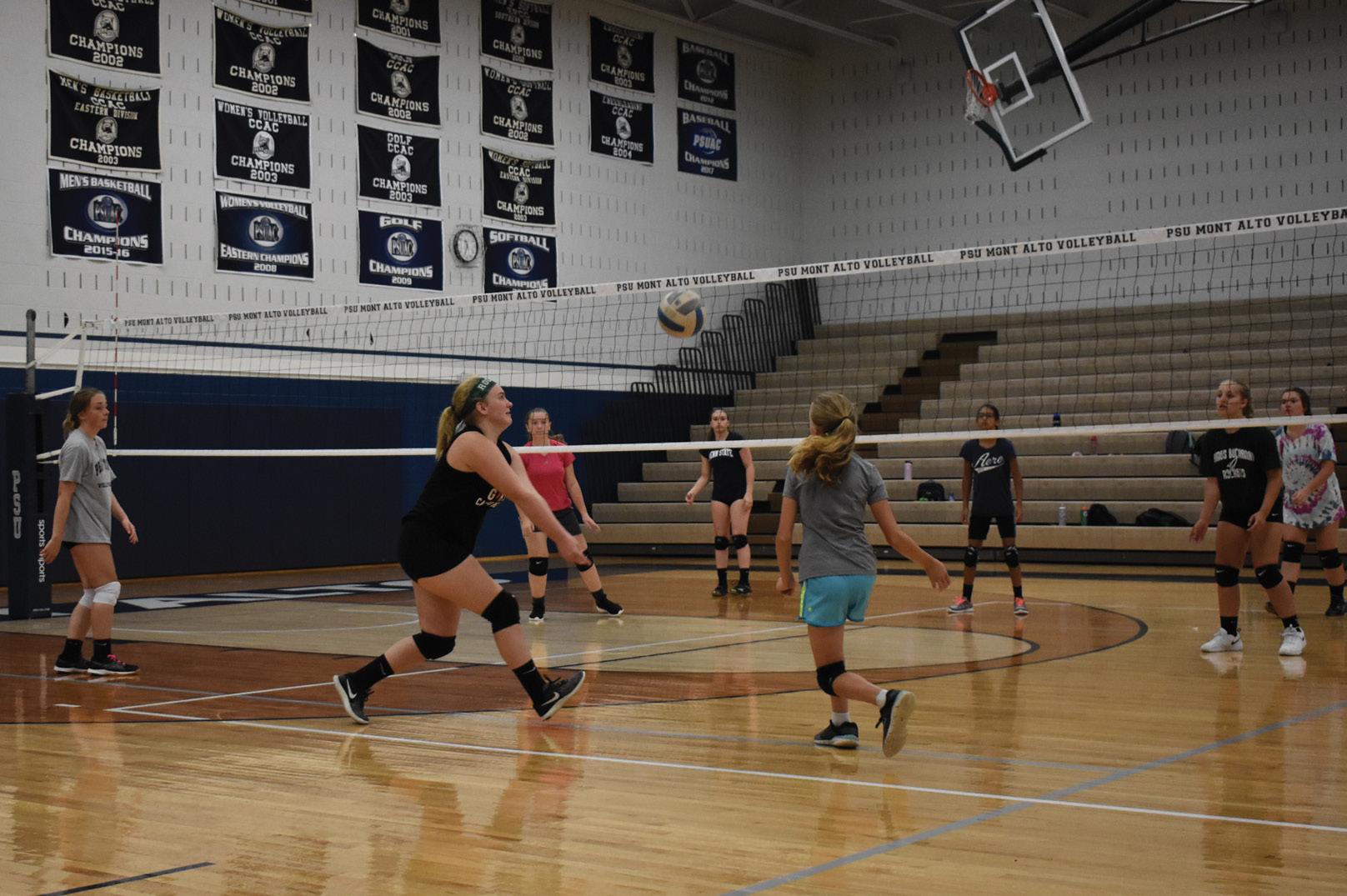
Children learn skills at the Penn State Mont Alto volleyball camp. Submitted photo
Penn State Mont Alto’s MedCamp is popular with students interested in healthcare careers. Submitted photo

Where the wild things are
There is plenty of room to spread out while expanding knowledge of all things nature-related.
Thanks to plentiful acreage at its two preserves, the Potomac Valley Audubon Society was able to offer camps last summer, albeit to smaller numbers of children. Amy Moore, lead teacher and naturalist, as well as Audubon Discovery Camp director for the PVAS,
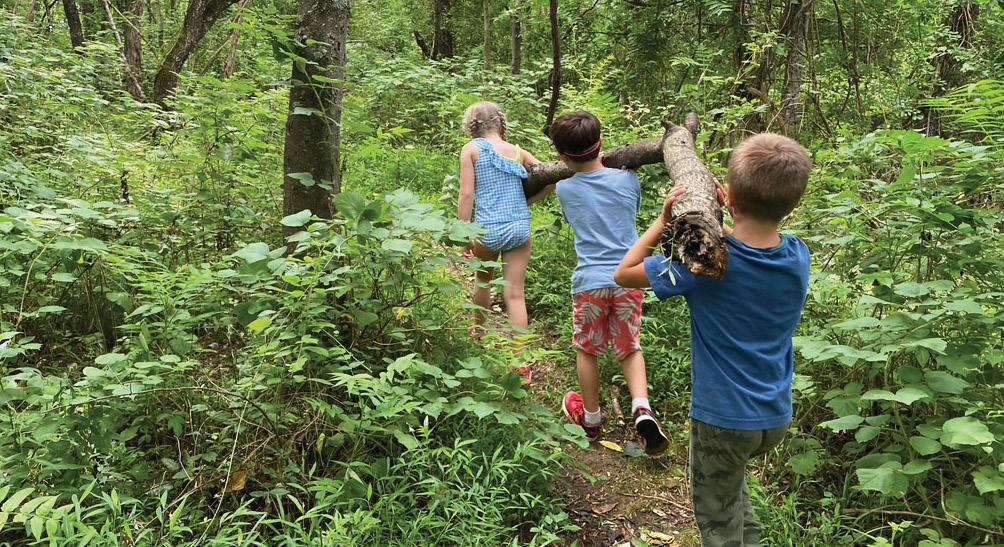
Potomac Valley Audubon Society campers enjoy exploring nature. The society offers camps at its two preserves, Yankauer Nature Preserve in Martinsburg, W.Va., and Cool Spring Nature Preserve in Charles Town, W.Va. This year, 20 campers will be allowed per session at each location, where they will learn about water, animals, plants and their senses. Submitted photo
said in-person camps in 2020 were available to 10 campers per session at each site rather than the typical 30.
Except when they used the restrooms, the participants were outdoors all the time at Yankauer Nature Preserve in Martinsburg, W.Va., and Cool Spring Nature Preserve in Charles Town, W.Va. They were taught to wipe down the bathrooms after each use, and each day had their temperatures checked and were asked a series of questions about their potential exposure to the coronavirus, she said.
Children did not wear masks last summer, but they did in autumn during PVAS’ outdoor school and they will this summer.
“The kids are really good about keeping themselves accountable,” Moore said, explaining that they reminded each other to put on their masks and kept plenty of space between themselves.
They took “mask breaks,” during which they stayed farther away from each other, but Moore noted that some kids opted to leave their masks on their faces.
By following the guidelines established by the Centers for Disease Control and Prevention, staffers are “making sure we’re doing the best we can do to prevent the spread (of COVID-19),” she said.
This year, 20 campers will be allowed per session at each location, where they will learn about water, animals, plants and their senses. They also can make art using only nature’s craft supplies and learn how to survive in the wilderness. Most of the camps are for children entering first through sixth grades, such as “Muck Monsters,” during which students can get “really dirty and wet, and really have fun” while tromping through the mud and streams, Moore said.
There are some options for older kids, too, such as “Stream Investigators” at Cool Spring for middle-schoolers who want to probe the waters of Bull Skin Run and Muskrat Pond for aquatic critters and conduct water-quality tests. There also is a counselor-in-training program for middle and high school students, through which they can become assistant counselors. Moore said lead counselors must be at least 18 years old.
After being cooped up and separated from their friends from March until early summer last year, Moore said families welcomed the chance to explore outdoors.
“People were so grateful for their kids to have some social, structured activities,” Moore said. “This is some sense of normalcy for their children.”
PVAS also understands if parents get nervous at the last minute about sending their kids to camp.
“We’re really flexible about cancellations and refunds,” Moore said. “We want people to be responsible and feel comfortable.” — Places
77
LEARN MORE
For more information about the programs mentioned here, go to:
Authentic Community Theatre Inc.: actforall.org | info@actforall.org 301-491-7228
Jefferson County Parks & Recreation Commission: jcprc.org | info@jcprc.org 304-728-3207
Mercersburg Academy: mercersburg.edu summerprograms@mercersburg.edu 717-328-6225
Penn State Mont Alto: montalto.psu.edu/ce ceclassinfo@ma.psu.edu 717-749-4117
For Mont Alto sport camp/clinic offerings, please contact Assistant Director of Athletics Frank Maira at fzm26@psu.edu or 717-749-6173
Potomac Valley Audubon Society: potomacaudubon.org 681-252-1387 amy@potomacaudubon.org
Tree Trekkers Frederick LLC: treetrekkersmd.com info@treetrekkersmd.com 301-888-TREK










